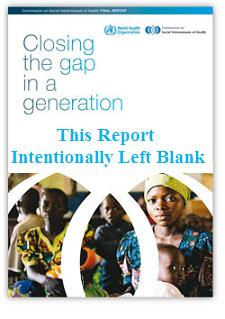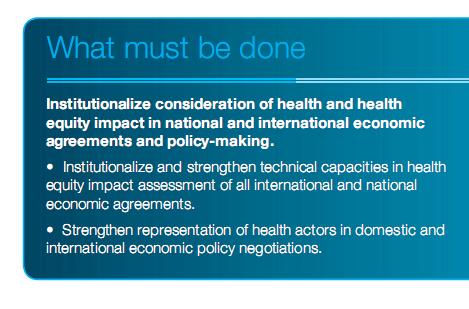"[You, not I, are] killing people on a grand scale"

A much lauded/quoted report, the World Health Organization's report on social justice
The report detects the subtle causes of social injustice in the world, adeptly avoids simple left/right political tropes and outlines several concrete steps to reduce inequality in an urgent and immediate way. That was the plan, anyway.
Instead, it concludes the introduction: "Social injustice is killing people on a grand scale."
The report is here, but I've chosen to link the Slovakian version of the 7.8MB pdf because if you read the English version The Ring will get you, it gets everyone. From now on, you'll want to sleep with a gun and a crucifix under your pillow. Works for me.
That the report is so politically biased as to be useless is not here the point, that's for Glen and Rachel to argue. The point, rather is to show what the purpose of such a document is, why it exists in a medical journal, and how social policy reform is now executed by a few, covertly.
First, simply to show that the report's recommendations are not just vague or impossible, they are not even comprehensible. Here are some specific recommendations, chosen entirely at random:
- Set up an interagency mechanism to ensure policy coherence for early child development such that, across agencies, a comprehensive approach to early child development is acted on.
Fie upon it. Here's another, this one was in bold:
Adopt a social determinants framework across the policy and programmatic functions of the ministry of health and strengthen its stewardship role in supporting a social determinants approach across government.
A short one, I assume written in Fortran:
- Institutionalize and strengthen technical capacities in health equity impact assessment of all international and national economic agreements.
And you'll say, "oh, come on, that's not random, you're just selecting them out of context." Enjoy your context:

Don't ask me how I know this, but I am 100% certain this report was typed on a Mac.
The ones you can understand make you a bit uneasy, even if you're for them:
Strengthen gender mainstreaming by creating and financing a gender equity unit within the central administration of governments and international institutions.
•Create a dedicated budget for generation and global sharing of evidence on social determinants of health and health equity.
•Build national capacity for progressive taxation and assess potential for new national and global public finance mechanisms.
A working definition of social justice is you get what you deserve and you deserve what you get. The report is free and in the British Medical Journal, so in that sense it is supremely just.
II.
Now, to why the report exists, what is anyone supposed to do with it?
None of these recommendations can or will be implemented, and, indeed, this report does not exist for that purpose. The report is pure Borges. It exists not to be read-- it wouldn't even matter that it was actually written, so long as people believed it had been written; it exists in order to be referenced, to be able to say "the WHO says that social injustice is killing people on a grand scale" (4500 hits); to validate individual's opinions as if they were grounded in science. The idea is to create a scientific basis for an ideology, in the absence of science. In psychiatry we call those "thought leaders," and the rest of you laymen call them "experts."
For example, the report allowed this professor of clinical epidemiology to say:
Pointing to the harmful health consequences of the "market oriented economic policies" pursued since the 1980s that have led to a "significant reduction in the role of the state and levels of public spending and investment," the report provides evidence that equity oriented growth can produce the health gains of development without the adverse effects of growth that favours the "interests of a rich and powerful minority over the interests of a disempowered majority."Fortunately, he knows that the data to which he refers is-- his words-- "not value free." Unfortunately, he thinks that's a good thing.
Don't get sucked into arguing about this on the basis of politics. Argue on the merits of the data. Otherwise, these politically motivated interpretations of reality will lead to stunningly idiotic policy decisions, such as the one quoted by this person who I assume has meningitis:
"If we could do something about prevention, we could empty the hospital wards."Really? Can the editor of the British Medical Journal be simultaneously politically indignant and naive to think that hospitals fill because people are sick?
III.
So if that's what the report is for-- to serve as a superscript to someone's personal proclivities-- what is the basis of that report? Not what does it say, but what is the underlying thesis?
Gas up your airplanes.
Part 2 soon.
17 Comments